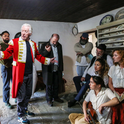British theatre is in some kind of timewarp. It revives 40-year-old plays considered to be radical in their day as if they were modern classics. It treats the 1960s generation of left-wing dramatists, including Edward Bond, Harold Pinter, David Hare and Howard Brenton, as if they were beyond criticism. But we have moved on since those days, and they have not moved with us.
Jonathan Kent must have thought that it would come as a bit of a shock to offer Bond's 1973 play The Sea during his season as artistic director at the Haymarket. This is the most Edwardian of London's theatres, perfect for a revival of The Importance of Being Earnest; whereas Bond is a poet of the left, accustomed to wag an accusing finger at the middle classes that make up the bulk of the Haymarket's audiences. Yet seeing the play—which runs until 19th April—brought no shock at all. It was as if this early warning against the perils of Thatcher, who when the play was first seen was known to the left as "milk-snatcher," is what we have come to expect from the theatre.
The Sea is over the top and farcical, which may be why it is billed as a comedy. A grand lady, Mrs Rafi, ruins a haberdasher with her extravagant orders and failure to pay, until he turns mad, blaming aliens for the collapse of his business. It has one scene of mindless violence—Bond's trademark. The shopkeeper ferociously stabs the corpse of a drowned man, mistaking him for a foreigner. The British class system, in short, is to blame for the ruin of the economy and the way in which we behave so aggressively towards others.
Does anyone still believe this nonsense? Bond's high style, as with other writers of his generation, disguises the way in which he manipulates the story to arrive at a familiar political point—liberal democracy is class exploitation in disguise. We smile at the aphorisms, while taking for granted the woodenness of the puppets who speak them. These stylish tracts were like Sobranie cigarettes, lovely to look at but poison to inhale.
In his overindulgent survey of post-war theatre, State of the Nation, Michael Billington has hailed the irreverence of this period, but irreverence is too gentle a word. Shaw was irreverent and so, in his way, was JB Priestley. The 1970s was a more concerted attack on the English way of life, which was perceived to be tottering. But can anyone read David Hare's Fanshen, celebrating the cultural revolution in China, or Brenton's Weapons of Happiness, which opened the Lyttelton, without a squirm of embarrassment?

In 1965, The Homecoming was celebrated as a feminist tract, a reminder that women as well as men have dangerous passions. But it no longer seems strange that a girl should want a variety of men or have ambivalent feelings about violence. We see similar stories on television. Nowadays The Homecoming seems like a slow and sinister build-up to a porn movie that never happens.
Or take David Hare's latest, The Vertical Hour, playing at the Royal Court. "I'd known for a long time I was going to have an accident," says Oliver, an urbane, casually dressed doctor. "You signal right, intending to go left. And you pay the price." In his case, it was a car crash, although this being Hare, one may detect a political metaphor. But if you signal left, and turn left, and go on doing so, you end up in a place that looks like the point from which you started, which is another kind of accident. And we—or a substantial slice of British theatre—are in the middle of it.
If we substitute the names of Vietnam for Iraq, or Suez for Vietnam, The Vertical Hour could have been written at any time over the past 50 years—or even before. A feisty young woman, Nadia, who teaches politics at Yale, is taken by her alienated boyfriend, Philip, to meet his father, Oliver, who has fled from the world into Shropshire. They discuss such matters as free love, whether it is right to intervene to get rid of cruel dictators, and what is happening to the youth of today. It is perilously close to being like an after-dinner chat in Bremner, Bird and Fortune, but without the jokes.
Each of these plays features fine performances. They are well staged and directed, and spoken with the regard for nuance that is our theatre's pride. But it is as if we have been hibernating for half a century. We have our own "Aunt Ednas," Kenneth Tynan's stalwart of the matinées, but they happen to be the 1960s radicals, still with shaggy hair and glasses, plaintively explaining where we went wrong. Like Aunt Edna, their hearts may be in the right place, but they come from another world.










